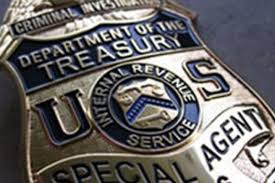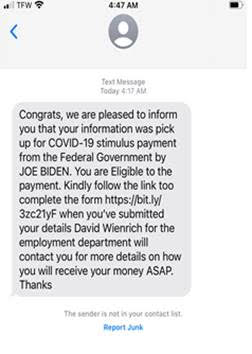
UNDATED – The Internal Revenue Service received a record number of complaints about Economic Impact Payment scams in June and July 2021 not seen in more than a decade.

“Criminals will look for any opportunity to take what they are not entitled to and this is no exception,” said Acting Special Agent in Charge Justin Campbell, of IRS Criminal Investigation, Chicago Field Office. “While this is not the first time that EIP payments have been targeted, this increase in scams is alarming. This payment is meant to help those that are struggling to get by as a result of the economic downturn caused by the pandemic. Be wary of any phone calls, emails, or text messages asking for your personal information or offering a deal that seems too good to be true.”

“The protection of our citizens from fraudsters and their schemes requires two things. The unflagging efforts of federal law enforcement to investigate and prosecute these criminals but also the awareness of all people that these scams exist, what they look like and how they work,” stated John E. Childress, Acting U.S. Attorney for the Southern District of Indiana. “When faced with those two things, most fraudsters will think twice before attempting to victimize another unsuspecting individual.”
Phishing scams attempt to mirror legitimate IRS communications with the goal of convincing unsuspecting taxpayers to enter personal information or submit a payment. This information is then exploited by scammers.
Recent scam reports include:
- Text messages stating that a taxpayer is eligible for a “stimulus payment” and they must click on a link to complete the necessary information to claim it.
- Phishing emails claiming the IRS has calculated a taxpayer’s “fiscal activity” and they are eligible for an Economic Impact payment in a specific amount.
Although criminals are constantly changing their tactics, taxpayers can help protect themselves by acting as the first line of defense. The best way to avoid falling victim to a scam is to know how the IRS communicates with taxpayers. The IRS does not send unsolicited texts or emails. The IRS does not threaten individuals with jail or lawsuits, nor does it demand tax payments on gift cards or via cryptocurrency.
Taxpayers should be on the lookout for grammatical, capitalization, and spelling errors in emails and texts, which serve as fraud indicators. Taxpayers should also exercise caution when clicking shortened URLs, which can lead to fraudulent web pages.

Taxpayers who receive unsolicited emails or social media attempts to gather the information that appears to be from either the IRS or an organization closely linked to the IRS should forward the message to phishing@irs.gov. Taxpayers are encouraged not to engage potential scammers online or on the phone.
Taxpayers can report fraud or theft of their Economic Impact Payments to the Treasury Inspector General for Tax Administration (TIGTA). Reports can be made online at TIPS.TIGTA.GOV.
If you suspect you are a victim of identity theft as a result of a scam, visit the Taxpayer Guide to Identity Theft to know what steps to take.
To learn more about COVID-19 scams and other financial schemes, visit IRS.gov. Official IRS information about COVID-19 and Economic Impact Payments can be found on the Coronavirus Tax Relief page, which is updated frequently.



